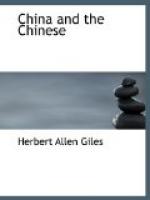May we not then plead that this Chinese statesman, equally with Lord Granville, at a crisis of his life, recurred to the great thoughts and images of the literature in which he had been trained, and found there what braced and fortified him, a comfort, an inspiration, an utterance for his deeper feelings?
Chinese history teems with the names of men who, with no higher source of inspiration than the Confucian Canon, have yet shown that they can nobly live and bravely die.
Han Yue of the eighth and ninth centuries was one of China’s most brilliant statesmen and writers, and rose rapidly to the highest offices of State. When once in power, he began to attack abuses, and was degraded and banished. Later on, when the Court, led by a weak Emperor, was going crazy over Buddhism, he presented a scathing Memorial to the Throne, from the effect of which it may well be said that Buddhism has not yet recovered. The Emperor was furious, and Han Yue narrowly escaped with his life. He was banished to the extreme wilds of Kuangtung, not far from the now flourishing Treaty Port of Swatow, where he did so much useful work in civilising the aborigines, that he was finally recalled.
Those wilds have long since disappeared as such, but the memory of Han Yue remains, a treasure for ever. In a temple which contains his portrait, and which is dedicated to him, a grateful posterity has put up a tablet bearing the following legend, “Wherever he passed, he purified.”
The last Emperor of the Ming dynasty, which was overthrown by rebels and then supplanted by the Manchus in 1644, was also a man who in the Elysian fields might well hold up his head among monarchs. He seems to have inherited with the throne a legacy of national disorder similar to that which eventually brought about the ruin of Louis XVI of France. With all the best intentions possible, he was unable to stem the tide. Over-taxation brought in its train, as it always does in China, first resistance and then rebellion. The Emperor was besieged in Peking by a rebel army; the Treasury was empty; there were too few soldiers to man the walls; and the capital fell.
On the previous night, the Emperor, who had refused to flee, slew the eldest Princess, commanded the Empress to commit suicide, and sent his three sons into hiding. At dawn the bell was struck for the Court to assemble; but no one came. His Majesty then ascended the well-known hill in the Palace grounds, and wrote a last decree on the lapel of his robe:—
“Poor in virtue, and of contemptible personality, I have incurred the wrath of high Heaven. My ministers have deceived me. I am ashamed to meet my ancestors; and therefore I myself take off my cap of State, and with my hair covering my face, await dismemberment at the hands of you rebels.”
Instead of the usual formula, “Respect this!” the Emperor added, “Spare my people!”
He then hanged himself, and the great Ming dynasty was no more.




